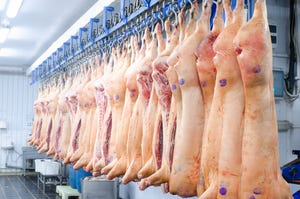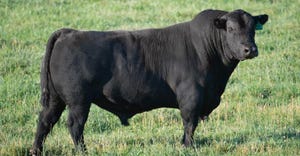How election night affects ag committees
New leaders will be at helm of both House and Senate agriculture committees.

Although election night results are not finalized, it does appear likely that the Senate will remain in Republican control. The other big news maker for agriculture Tuesday night was that House Agriculture Committee chairman Collin Peterson (D., Minn.), a longtime champion of agriculture, loss of his seat.
With many races still unable to confirm a winner, the message from voters has been mixed, so it’s hard to come up with a more closely divided scenario, according to Jonathan Coppess, assistant professor and director of the Gardner Agriculture Policy Program at the University of Illinois.
“You would hope, in our best minds of citizens of the same country, that you would step back from the combat of an election and everybody tries to reassess,” Coppess said, adding that he remains uncertain about what the takeaways of a partisan mindset are, but unfortunately, it doesn’t likely include bipartisanship.
When somebody like Peterson loses in a conservative district, Coppess questioned whether that inspires more people to be bipartisan. If the Senate does remain in Republican control, how does Senate majority leader Mitch McConnell (R., Ky.) plan out his strategy? “If recent history is our best guide, we’ve not seen a trend towards bipartisanship,” Coppess said. “That would be concerning from a farm bill perspective and from a governing perspective.”
With the departure of Peterson and the planned retirement of Senate Agriculture Committee chairman Pat Roberts (R., Kan.), it means neither agriculture committee chair will be at the helm when the new Congress takes office in 2021.
Senate holds the line
The seats of seven Senate Agriculture Committee members were up for re-election, including Roberts’ position. Other members include McConnell, Joni Ernst (R., Iowa), Cindy Hyde-Smith (R., Miss.), Kelly Loeffler (R., Ga.), Tina Smith (D., Minn.) and Dick Durbin (D., Ill.). All of these members secured the win, and Rep. Roger Marshall (R., Kan.) was elected to fill Roberts’ seat from Kansas.
Loeffler has not secured the win, which requires a 50% majority, as it was part of a special election to fill Sen. Johnny Isakson’s seat when he retired last year. She was running against Rep. Doug Collins and Democrat Raphael Warnock, although Collins conceded to Loeffler. Both Collins and Loeffler are staunch conservatives who voiced support for President Donald Trump. The special election is heading to a Jan. 5 runoff.
Before Election Day, Ernst was thought to be in a tight race with Democratic challenger Theresa Greenfield but ended the night was a nearly 52% to 45% lead over Greenfield. When Democrats saw that the Iowa Senate seat was in play, millions of dollars poured in from outside the state to try to flip the Senate seat. Greenfield campaigned heavily against Ernst on topics such as the Trump Administration’s handling of the Renewable Fuel Standard small refinery waivers as well as allowing oil lobbyist Andrew Wheeler to be appointed administrator of the Environmental Protection Agency.
Although not on the agriculture committee, agricultural advocate Sen. Steve Daines (R., Mont.) was able to hold onto his seat, and it appears that U.S. Agriculture Secretary Sonny Perdue’s cousin, Sen. David Perdue (R., Ga.), will also hold onto his seat. Meanwhile, the outcome of another important farm state seat held by Sen. Thom Tillis (R., N.C.) is still too close to call but is leaning toward Tillis holding the seat for Republicans.
The junior senator from Minnesota, Sen. Tina Smith (D., Minn.), received support from the Minnesota Farm Bureau Federation political action committee heading into the election and was able to retain her seat.
Sen. John Boozman from Arkansas is thought to be next in line for the chairmanship, but that will depend on the leadership election among the committee, which should happen in January.
House Ag Committee changes
With Peterson’s departure and the House expected to easily remain under Democrat control, Reps. David Scott (D., Ga.), Jim Costa (D., Cal.) and Marcia Fudge (D., Ohio) are in the running to take over as chair. Costa, who has represented California's San Joaquin Valley since 2005, was raised on a dairy farm and considers himself a third-generation family farmer.
House Agriculture Committee ranking member Michael Conaway (R., Texas) also retired this year, leaving a void for both leadership positions. This presents an interesting dynamic on the work that may start for the next farm bill, which is set to expire in 2023. The traditional North versus South divide among leadership has also potentially shifted, with more southern lawmakers taking top leadership roles on the committees.
According to the 2017 "Census of Agriculture," only about 45 of the 435 House members have districts with more than 20,000 farm operators. Peterson recently talked about the difficulty in finding Democrats who even want to serve on the agricultural committee, and this year’s new members are likely to be from suburban, not rural, districts.
Peterson said peanut and cotton growers had recently campaigned for him in Minnesota, and farm lobby groups had backed the Democrat because of his high profile on the committee. Peterson was one of only two Democrats to vote against Trump’s impeachment.
Many comments came in thanking Peterson for his devoted service to the agricultural community for the last three decades.
American Farm Bureau Federation president Zippy Duvall said: “Throughout his years on the House Agriculture Committee, especially his years as the committee’s chairman, Congressman Peterson has been a leader for rural America on such important issues as the farm bill, regulatory reform and new trade deals. He made it clear through his work that his politics are grounded in farmers, livestock producers and rural America. That will be his legacy.”
Seats for freshman committee members Reps. Xochitl Torres Small (D., N.M.) and Anthony Brindisi (D., N.Y.) were considered vulnerable heading into the election, and both did lose to Republican challengers. Another newcomer, Rep. Abigail Spanberger (D., Va.), lost her re-election bid. The House Agriculture Committee also lost Rep. TJ Cox (D., Cal.).
It looks like Rep. Cindy Axne (D., Iowa) narrowly defeated David Young, who she beat in 2018. Rep. Cheri Bustos (D., Ill.) also declared victory over her Republican challenger Esther Joy King.
All of the Republican members on the House Agriculture Committee were re-elected or likely will be replaced by a Republican.
Incumbent Rep. Ted Yoho’s former aide, Kat Cammack, won Florida’s Third Congressional District on Tuesday to replace Yoho, who said he was retiring from Congress this year. Yoho, a veterinarian and the top Republican on the House Foreign Affairs Asia subcommittee, was first elected in 2012.
Rep. Ralph Abaham (R., La.) announced in February that he would not seek re-election to the House, and his seat has a crowded field requiring an additional runoff election. Republican Luke Letlow is in the lead.
As mentioned above, Marshall of Kansas served on the House Agriculture Committee but now heads to the Senate and is likely to also serve on the Senate Agriculture Committee.
About the Author(s)
You May Also Like




.png?width=300&auto=webp&quality=80&disable=upscale)
